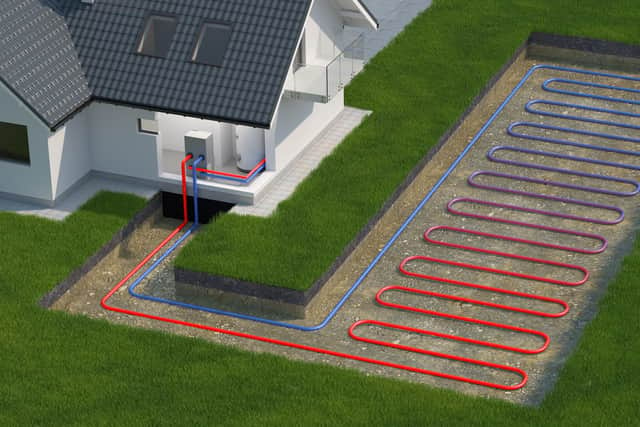Analysis: More than hot air needed to bring about heat pump revolution
Similar questions are being asked in Scotland, where the devolved government is dangling carrots before homeowners thinking of replacing their gas boilers with a more environmentally friendly alternative heating system.
Although there is no identical grant scheme in place north of the border, the Home Energy Scotland scheme offers households a maximum interest-free loan of £2,500 to install a heat pump in their property. The sum is repayable within five years, although cashback of up to £7,500 is also available.
Advertisement
Hide AdAdvertisement
Hide AdSuch initiatives are viewed as integral to the Scottish Government’s ambitions of doubling the number of zero emission heating systems installed in Scotland every year for the next five years. Ultimately, it hopes to reach 200,000 installations a year by the end of this decade, the vast majority of which will be individual air and ground source heat pumps.
But so far, interest from consumers has been decidedly lukewarm. This year, Home Energy Scotland has approved loan funding for around 80 hybrid heat pumps so far - a small number, albeit a major increase on the previous year, when it was in single figures.
In order to be eligible for the loans, which are administered by the Energy Saving Trust, homeowners need to use an installer who is registered with the Microgeneration Certification Scheme (MCS).
This requirement, at present, is a major stumbling block towards take-up. An online network of suppliers, maintained by the Energy Saving Trust, shows that there are swaths of the nation with no MCS installers.


The problem is particularly acute in rural areas. North of Ullapool, for example, there are only two such installers on the mainland. The south west is also particularly poorly served. Even in a major urban centre like Edinburgh, home to more than half a million people, the number stands at around a dozen. When you consider the fact that a heat pump installation can take several days, that shortfall is a problem which must be addressed, and quickly.
The reasons for such small numbers are in part explained in the minutes of the most recent meeting of the Scottish Government’s expert advisory group on heat pumps.
The April gathering heard how there were common concerns among installers that switching to renewable heat could impact on the financial sustainability of their business. Others, the meeting heard, wondered whether there was enough demand, or whether they would be able to attain the necessary skills.
The lack of certified installers is not the only issue preventing the widespread rollout of heat pumps. The pandemic has also had a major impact on delays to scheduled installations and improvements. But even in normal times, the nature of Scotland’s housing stock is perhaps the greatest challenge.
Advertisement
Hide AdAdvertisement
Hide AdOnly last month, Energy Systems Catapult (ESC), an independent, not-for-profit centre set up to help accelerate the transformation of the energy network, completed an analysis of the suitability of Scotland’s housing stock for ground and air source heat pumps.
The report, commissioned by Nesta, made for disconcerting reading, not least for those tasked with delivering the nation’s bold climate change targets.
It found that older properties, such as tenements - which make up around 28 per cent of Scotland’s urban housing stock - will require substantial and costly energy efficiency measures in order for heat pumps to meet an acceptable standard of comfort and cost.
Such properties, it added, were constrained in terms of space – a problem for those wanting to install certain heat pumps. Even in ground floor properties, the relative lack of floorspace posed a “significant barrier,” given some jobs will require additional pipework, and even the installation of a buffer tank.
For those properties deemed suitable for a heat pump, there will still be hoops to jump through. ESC’s report warned that installing one in a pre-1914 flat without expensive retrofit measures to improve insulation would leave the house “below acceptable comfort levels” for more than 22 per cent of the time during the coldest periods of the year.
Kyle Usher, Nesta’s mission manager for Scotland, pointed out making Scotland’s housing viable for heat pumps is a major - and expensive - hurdle yet to be overcome.
He explained: “Older housing stock such as tenement blocks would require substantial and costly energy efficiency measures, including to the fabric of the buildings, which is often prohibited by current planning restrictions, in order for low-carbon heating alternatives such as heat pumps to deliver an acceptable standard of comfort at an affordable price.”
Addressing this fundamental problem will take time and money, and the Scottish Government will have to ask itself how far it is prepared to go to stimulate the supply chain and entice homeowners to make the switch. Its expert advisory group on heat pumps has said that if there no replacement forthcoming for the Renewable Heat Incentive, then it should consider rolling out its own grant programme.
Advertisement
Hide AdAdvertisement
Hide AdAs things stand, only around 3,000 heat pumps are installed each year in Scotland. The government wants that figure to reach 64,000 a year by 2025. If that target is to be met, it will require a lot more carrots.
A message from the editor:
Thank you for reading this article. We're more reliant on your support than ever as the shift in consumer habits brought about by coronavirus impacts our advertisers. If you haven't already, please consider supporting our trusted, fact-checked journalism by taking out a digital subscription.
Comments
Want to join the conversation? Please or to comment on this article.
